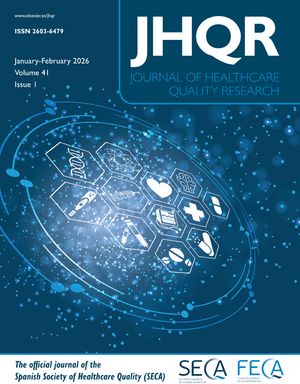Valorar la satisfacción de los pacientes de consultas externas del servicio de urología del Hospital La Paz e identificar posibles problemas en la atención.
Material y métodoEstudio transversal utilizando un cuestionario de satisfacción que se entregó a los pacientes que acudieron a los centros de consultas externas de urología durante una semana del mes de noviembre de 2002.
ResultadosLa encuesta fue contestada por un total de 532 pacientes. La mitad de los pacientes pertenecen al grupo de mayores de 65 años. El 72,2% conoce el nombre del urólogo que les atiende, mientras que sólo el 27,4% conoce el de la/el enfermera/o. Al estratificar esta variable por centro, observamos que el número de pacientes que afirma conocer el nombre de su urólogo en consultas hospitalarias es superior (197; 86,4%) que en centros de especialidades (171; 70%). En los centros de especialidades, el 22,9% afirma que el tiempo dedicado a su consulta fue “escaso” o “muy escaso”; en las cuatro salas del hospital es del 6,7%. Encontramos diferencias significativas al comparar la satisfacción entre centros respecto a las variables información sobre riesgos del diagnóstico y tratamiento, instrucciones dadas tras el alta y descripción de los síntomas por los que el paciente debe consultar de nuevo al urólogo. La satisfacción es mayor en consultas hospitalarias. Ciento setenta y dos (32,3%) de los pacientes han realizado sugerencias. El grupo más numeroso corresponde a las relacionadas con la mejora del sistema de citaciones, la reducción de la lista de espera y el excesivo tiempo de espera previo a la consulta. La satisfacción global con el servicio presenta diferencias significativas entre pacientes que acuden a consultas hospitalarias y a centros de especialidades externos.
ConclusionesEl conocimiento del nombre de los profesionales sanitarios, el tiempo dedicado a consulta y la información sobre riesgos derivados del diagnóstico y tratamiento son aspectos muy valorados por los pacientes de consultas de urología y están asociados a una mayor satisfacción global con el servicio. La espera previa a la consulta y las dificultades para la citación son las oportunidades de mejora expresadas mayoritariamente en el apartado de sugerencias. Existen diferencias en la satisfacción entre pacientes de consultas hospitalarias y consultas de centros de especialidades.
To evaluate satisfaction among patients attending the outpatient clinics of the Urology Department of La Paz Hospital and to identify any problems with the care they receive.
Material and methodWe performed a cross-sectional study. A questionnaire was given to all patients who attended the outpatient clinics of the Urology Department over a 1-week period in November 2002.
ResultsThe survey was completed by 532 patients. More than half of the patients attending the urology outpatient clinics were over 65 years old. A total of 72.2% of patients knew the name of the urologist, whilst only 27.4% knew the nurse’s name. When this variable was stratified by center, the number of patients who knew their urologist’s name was 197 (86.4%) in hospital clinics and was 171 (70%) in ambulatory care clinics. In the latter, 22.9% of the patients surveyed reported that the time dedicated to their consultation was “short” or “very short”, whilst in the four hospital clinics this percentage was 6.7%. Significant differences were found on comparing satisfaction between centres with information about diagnosis and treatment risks, instructions before discharge and descriptions of symptoms for which patients would need to see their urologist again. Satisfaction was higher in hospital clinics. Suggestions for improvement were made by 172 patients (32.3%). Most related to the appointments system, reducing the waiting list and the time spent waiting for a consultation. Overall satisfaction showed significant differences between patients attending hospital clinics and those attending ambulatory care clinics.
ConclusionsKnowing the health professional’s name, the time given by the doctor to the consultation and information about diagnosis and treatment risks were highly valued by patients attending the Urology Department and were associated with a high overall level of satisfaction. Waiting times before the consultation and difficulties in getting an appointment were the most common complaints. Differences in the level of satisfaction were found between patients attending hospital outpatient clinics and those attending ambulatory care clinics.






